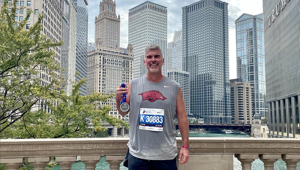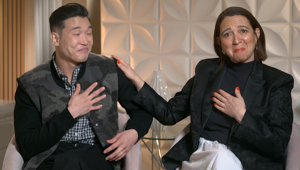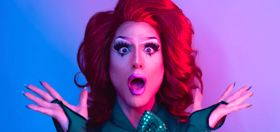 Jose Antonio Vargas is living the American dream. As an overachieving, socially awkward child growing up in Mountain View, California, Jose found solace in the stacks of books at his local library. He boldly came out as gay after watching The Times of Harvey Milk in his high school history class. His love of the written word and tenacity would lead him to a successful journalism career writing for the San Francisco Chronicle, Philadelphia Daily News and The Huffington Post. In 2008 he was part of the Washington Post team that won the Pulitzer Prize for their coverage of the Virginia Tech shootings.
Jose Antonio Vargas is living the American dream. As an overachieving, socially awkward child growing up in Mountain View, California, Jose found solace in the stacks of books at his local library. He boldly came out as gay after watching The Times of Harvey Milk in his high school history class. His love of the written word and tenacity would lead him to a successful journalism career writing for the San Francisco Chronicle, Philadelphia Daily News and The Huffington Post. In 2008 he was part of the Washington Post team that won the Pulitzer Prize for their coverage of the Virginia Tech shootings.
Yet for all his hard work and accolades Vargas was hiding a very big secret: He was an undocumented immigrant, living illegally in the United States. In a 2011 New York Times magazine piece Vargas revealed the details of this facet of his life. He chats with writer Heath Daniels about his new documentary, Documented (now playing in select theaters), in which he shares his personal story and challenges us to reconsider what it means to be an American.
What does the immigration rights movement have in common with the gay rights movement?
You always have to be a bit careful when you make these parallels, but I think there are so many similarities. Let me give you an anecdote, which may be the best way I can answer this. I was invited to go to the University of Louisville for national coming out week. There was a wonderful woman who was the head of the LGBT center. When she began marketing the event at the university and to the community she started hearing from young Latinos and students saying, “Hey, we would love to come to this event.” And the woman said, “Oh, that’s great. Are you gay?’ They said, “No, weren’t not. We love gay people. (But) We’re actually undocumented.” She didn’t realize that the younger undocumented community used the term, “coming out” also. So this wonderful woman ended up organizing a dinner and brought together undocumented young Latinos and the LGBT leaders of the community. It was a really awesome way to bring the communities together in this idea that we both use the term, “coming out.” I don’t think it’s an accident that many of the undocumented young leaders are also openly gay. These issues intersect.
How about we take this to the next level?
Our newsletter is like a refreshing cocktail (or mocktail) of LGBTQ+ entertainment and pop culture, served up with a side of eye-candy.
 The gay rights movement clearly has political influence. What can the immigration movement learn from the gay rights movement?
The gay rights movement clearly has political influence. What can the immigration movement learn from the gay rights movement?
I would argue that before the political influence came the cultural influence. The culture of LGBT issues changed before the politics of LGBT issues. What Chad Griffin did with Prop 8 couldn’t have happened if the culture hadn’t championed it. That is something I very much took to heart. How do we change the culture of immigrant rights in this country? We still have the New York Times, Washington Post and the Wall Street Journal calling immigrants illegal. We need to shift the culture of immigrant rights and undocumented immigrants in America and I think that’s something we can learn from the LGBT community. Let’s look at Arizona. (Arizona Governor) Jan Brewer signed SB 1070, which at the time was the most draconian anti-immigration law in the America. So what happened a few months ago when she was presented with the antigay bill [SB 1062]? She vetoed the bill but has kept the anti-immigrant bill. SB 1070 is alive and well in the state of Arizona. What does that tell you? It would have been unacceptable for Jan Brewer to sign that antigay bill into law because the culture of LGBT rights has completely changed. The same thing can’t be said for immigrant rights.
 By his own admission, President Obama’s position on gay marriage has evolved over his tenure as president. But, he is currently known as “Deporter in Chief” among immigration advocates. Do you think he’s less evolved on this subject or is there just more opposition to it?
By his own admission, President Obama’s position on gay marriage has evolved over his tenure as president. But, he is currently known as “Deporter in Chief” among immigration advocates. Do you think he’s less evolved on this subject or is there just more opposition to it?
With all due respect and full fairness to the president, we can’t talk about the failure of immigration reform without talking about the Republicans in Congress that have blocked legislation from happening. I would like to think that the President of the United States, particularly the first minority president, doesn’t want to be remembered as the “Deporter in Chief.” But, that is a part of his legacy now.
I hope and pray that the president is doing the best he can. But the thing that hasn’t been clear to us, those who are directly impacted by this issue, is there isn’t a sense of moral crisis. Where is the fierce urgency when it comes to this issue? Especially when families are being separated every day. When we talk about immigrants, we are talking about mothers and daughters and sons and fathers. We’re not talking about some criminals off a pick-up truck.
 Have any politicians, or those in authority to impact policy change, seen Documented and what was their response?
Have any politicians, or those in authority to impact policy change, seen Documented and what was their response?
Our goal at Define America is to really move and shift the culture. The reaction has been very positive and I would love for more politicians to see the film but, just as important, I really want the American public to see the film. We just had a screening at Miami University (Oxford, OH) where Paul Ryan went to college. It was so gratifying to see young Americans after the film. All of the sudden the conversation changed to “What can a mother do for her child?”
Usually the question I get asked is, “Why can’t you just make yourself legal?” Which underscores the lack of information that people have when it comes to the legal process in America. When people see the film the question suddenly becomes, “What can a mother do for her child?” When Jeb Bush talked about (immigration reform) being “an act of love” that was a cultural statement, not a political one.
Vice President Biden recently made a comment about immigration reform while giving a commencement speech at Miami Dade College. A person in the audience yelled, “Stop Deportation!” in the middle of his speech. His response was, ”We’ll do that too kid, but let me finish my speech.” Should we be expecting some change in the near future regarding deportation policies in the U.S.?
Every speech that Vice President Biden and President Obama will give will be greeted with that, “What about deportation?” It’s the most urgent thing that this administration can do.
You’re a very successful gay journalist and the release of Documented has been heavily covered in the LGBT press. One would think the LGBT community, which has a long history of being marginalized and discriminated against, would be more sympathetic to your plight as an undocumented immigrant seeking equal protection. However, that hasn’t necessarily been the case. Did that surprise you?
I’m glad you asked about that. I think the issues of race and class within the LGBT community are issues that need further conversation. We are all part of one big LGBT community, but within that community are other communities. The struggle that an undocumented, young Mexican-American faces can be different than the struggle that a young, white American from Kentucky is facing. When I read these comments I think, “We need to further embrace diversity within our community.” That’s the first thing that comes to mind.
I’m a pretty thoughtful person. I anticipated and fully expected whatever criticism would come my way. I guess there was just a part of me, as a member of a community of people that have been marginalized and discriminated against, I was hoping for a little more empathy. What would you have done if you were in my shoes? As someone who is gay, as someone is undocumented, as someone who is Filipino, I was hoping that the LGBT community would understand the challenges that are associated with this issue. We are a community that is always asking for and insisting on inclusion, yet we often exclude others.
 You said in your 2011 New York Times magazine piece, “I have been unwilling, for years, to be in a long-term relationship because I never wanted anyone to get too close and ask too many questions.” Now that the truth is out, do you feel the freedom to be in a relationship in a way you wouldn’t have prior to coming out as undocumented?
You said in your 2011 New York Times magazine piece, “I have been unwilling, for years, to be in a long-term relationship because I never wanted anyone to get too close and ask too many questions.” Now that the truth is out, do you feel the freedom to be in a relationship in a way you wouldn’t have prior to coming out as undocumented?
Yes, it certainly gives me the freedom. [Laughs] Unfortunately, it doesn’t give me the time. Being with someone has never been a priority for me and now it is, I think. This is what happens when you run away from yourself for so long. Not running away from myself for being gay, I’ve always embraced the gay part of me since I was a teenager. But I always felt I was compromising people or I was making them complicit in something if I told them I was undocumented. I’m in this process. It’s only been three years, this process of embracing myself and liking myself for everything that I am. It’s been a really challenging and exhilarating process and I think a part of that is making the time to let people in.
Why do you think you haven’t been deported yet? Do you think they are less likely to do that because you are such a public figure?
The public-ness of this has protected me. A thousand people get deported every day and what do I do? I make a film. I am among, if not the most privileged, undocumented person in America. And with that kind of privilege comes great responsibility. I’m trying to be honest as possible. I’m trying to do the best that I can to insist on equality and give a voice to people that don’t have it.
Documented shows many of the struggles you go through, from the bureaucracy of the American legal system to the heartbreaking relationship you have with your mother. What has been the biggest reward about this whole journey?
The biggest reward for me is being fully myself. That’s the best reward. The hardest stories to tell are always the ones about ourselves. The most difficult person to fix is ourselves and I feel like I have finally done that. And now I feel like life has started. That’s a blessing.
Heath Daniels is a writer, producer and filmmaker.
Watch the trailer for Documented below.





















RayJacksonMs
They aren’t undocumented immigrants. They are foreign invaders and criminals. Call them what they are and stop trying to make their crimes a gay issue.
money718
Every country has immigration laws, I wish the US would enforce ours. Just a sad situation.
Mezaien
Great good start guys just fight for your rights! remember “when you get them by the balls the heart and mind will follow”.
Scribe38
Nice post queerty. Always interesting to see the nuts that post after any story that includes African Americans or Mexicans. Happy to see your board doesn’t worry about those voices and continues telling interesting stories. Good job!
Scribe38
@money718:@RayJacksonMs: Yes the nation that stole this land from Native Americans/Mexicans(Texas),and kidnapped Africans for slaves should stop others from coming in. You two make total sense.
pierrot
While I sympathize with the plight of these “undocumented immigrants”, I still do not agree with illegal immigration. Sure, the history of the USA isn’t flawless, but there are laws in place and everyone needs to respect the law of the land. I can’t just barge into someone’s house and demand them to treat me like a family member. There are already legal means for people to become citizens so people should pursue those means instead
iban4yesu
“They are foreign invaders and criminals”….
Yes, Dubiya, Chenney (war criminals) and their marauders in Iraq and Afghanistan (foreign invaders)… I know, I know, dear, don’t get your panties twisted in a knot over that now. All in its good time, dear.
Just keep yourself busy with polishing your own Pulitzer trophy or something, instead….
money718
@Scribe38: That’s such a tired and stupid argument that I am hesitant to respond. So what sort of immigration laws did the Native Americans have? Do you propose we have no immigration laws? Just let people come and go as they please? Why have any laws period? Idiot.
JimboinLA
Comparing illegal aliens with gay people is a desperate stretch. My parents didn’t make me gay like his made him an illegal alien. Our government makes it very easy to live here as an illegal alien (proper term) because we need cheap labor so we are definitely a big part of the problem. I can understand how frustration it is for these young people. I know a wonderful young woman who is in the exact same position. but you unfortunately rewarding people for breaking the law makes it worse which we should have learned with the Reagan/Bush “One time only” amnesty in 1986. It’s a very difficult situation.
DickieJohnson
Anyone who desires to live the “American Dream” should be able to do so. However, I don’t care if you are from Mexico or Mars, go through the correct process, obey our laws (which need to be enforced), and pay taxes, like other WORKING Americans, so we can give all the money ( and other free sh*t) to those who don’t want to work and pay taxes, and to other foreigners who hate us. “That’s just MY opinion, I could be wrong.” But, I don’t think so.
iban4yesu
Good job, Mr. Daniels!
Whoa, you are indeed a multi talented man! :
http://www.heathdaniels.com/HeathDaniels.com/Heath_Daniels.html
Ben Dover
I think there is a tremendous amount of sympathy for young people like him who grew up here and are in that legal limbo. They often have no memory of their native country, and in some cases wouldn’t even know the language if they got deported “back” there.
But it’s a HUGE leap from that to saying there should be no deportations of anyone, ever! That’s a totally novel interpretation of immigration “law” (non-law?).
Now the let-’em-all-in crowd doesn’t even want shady employers to be penalized for knowingly hiring illegals. (Apparently hiring them at below minimum wage is, like, an altruistic public service or something.) It’s embarrassing when some liberals start to sound like the Chamber of Commerce or the Ayn Rand libertarian nutbags on this issue.
Kangol
I think he’s so brave for coming forward. It’s about time we reformed our immigration laws, and not just for the benefit of global corporations and exploitative domestic and local ones.
KDub
@JimboinLA: “Comparing illegal aliens with gay people is a desperate stretch. My parents didn’t make me gay like his made him an illegal alien.” Either way, neither of you had a choice in the matter, so it’s basically the same. Also, please remember that homosexuality used to be punishable by law and technically still is in some states. Vargas remained very respectful and considerate in his answers, so maybe you could refrain from being such a d-bag?
KDub
@pierrot: Do you respect the laws of the land that prohibit same sex marriage too?
Fang
I would love to see this documentary! We definitely have shared experience as marginalized people and should support each other with compassion and empathy.